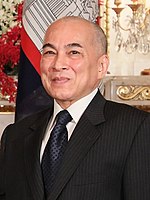Siamat: Difference between revisions
mNo edit summary |
mNo edit summary |
||
| Line 132: | Line 132: | ||
}} | }} | ||
'''Siamat''', officially the '''Republic of Siamat''' ({{wp|Khmer language|Svai}} សាធារណរដ្ ឞៃមៅត្ ''Satharonarodth Saimaut''), is a nation in [[Coius| | '''Siamat''' ({{wp|Khmer language|Svai}} ឞៃមៅត្ ''Saimaut''), officially the '''Republic of Siamat''' ({{wp|Khmer language|Svai}} សាធារណរដ្ ឞៃមៅត្ ''Satharonarodth Saimaut''), is a nation located in [[Coius|Southeast Coius]]. It is bordered by land exclusively by [[Kuthina]], although it shares a short land border to the north-west with the unrecognised nation of [[Heijiang]], and is bordered to the west by the [[Coral Sea]]. | ||
Siamat has a growing population of over 36 million. It is constitutionally a secular state, with [[Sotirianity]] being the largest {{wp|religion}} followed by 36% of the population, with followers of [[Badi]] at 31%, and [[Zohism|Zohists]] at 20%. While predominantly {{wp|Khmer people|Svai}}, minority groups include {{wp|Thai people|Kasi}}, {{wp|Chinese people|Xiaodongese}}, {{wp|Karen people|Kayah}} and 30 {{Khmer Loeu|highland tribes}}. The capital and largest city is Mouráng, which isthe political, economic and cultural centre of Siamat, while other important historical capitals include [[Kandaal]], and [[Chensae]]. Siamat is a [[National Principlism|National Principlist]] {{wp|Republic|republic}} headed by the [[State Counsellor]], currently [[Fabien Nhean]] since 2020, who is the {{wp|head of state}} and {{wp|head of government|government}}. | |||
==Etymology== | ==Etymology== | ||
Revision as of 15:35, 15 December 2020
Republic of Siamat សាធារណរដ្ ឞៃមៅត្ Satharonarodth Saimaut République du Siamat | |
|---|---|
| Capital and largest city | Mouráng |
| Official languages | Svai |
| Ethnic groups |
|
| Religion | |
| Demonym(s) | Siamati |
| Government | Unitary Presidential one-party republic |
| Fabien Nhean | |
| Lim Chanthou | |
| Legislature | Central Congress |
| Population | |
• 2020 census | 36,564,398 |
Siamat (Svai ឞៃមៅត្ Saimaut), officially the Republic of Siamat (Svai សាធារណរដ្ ឞៃមៅត្ Satharonarodth Saimaut), is a nation located in Southeast Coius. It is bordered by land exclusively by Kuthina, although it shares a short land border to the north-west with the unrecognised nation of Heijiang, and is bordered to the west by the Coral Sea.
Siamat has a growing population of over 36 million. It is constitutionally a secular state, with Sotirianity being the largest religion followed by 36% of the population, with followers of Badi at 31%, and Zohists at 20%. While predominantly Svai, minority groups include Kasi, Xiaodongese, Kayah and 30 Template:Khmer Loeu. The capital and largest city is Mouráng, which isthe political, economic and cultural centre of Siamat, while other important historical capitals include Kandaal, and Chensae. Siamat is a National Principlist republic headed by the State Counsellor, currently Fabien Nhean since 2020, who is the head of state and government.
Etymology
History
Classical
Medieval
Early-modern
Modern
Contemporary
Geography
Politics
The constitution of Siamat defines it as a republic guided by National Principlist thought. According to the current constitution, promulgated in 1978, Siamat is a unitary-state run according to republican principles and strong national guidance. The ruling party, Saim Muoy, is also the sole legal party, and has been in power since 1975.
The office of State Counsellor, currently occupied by Fabien Nhean, serves as Head of Government and Head of State. The State Counsellor oversees the State Council and Directory, and has a wide array of unchecked powers.
Government
The government of Siamat consists of the State Council and the Directory. The State Council serves as the main executive body, responsible for introducing legislation to the Central Congress, as well as ratifying and amending. It may also issue and extend executive decrees, though these must be ratified by the Central Congress if they are to become law. Its 50 members are nominated by the party and confirmed by the Central Congress. The State Council meets infrequently, and much of the its work is done by the Committee of the Interior, a much smaller body composed of selected members of the State Council.
The Directory is an advisory body which oversees the government's executive departments. Members of the Directory are appointed by the State Counsellor, and serve at their discretion. Both the State Council and Directory are headed by the State Counsellor.

